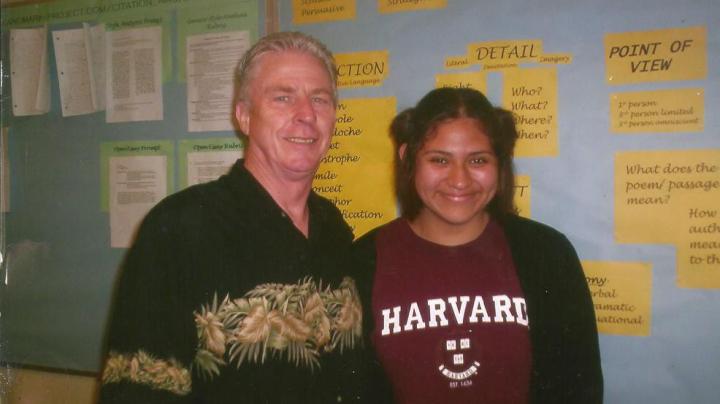After Making History at Harvard, This Latina Is 1st Undocumented Student to Earn PhD From Claremont

Courtesy of Gloria Montiel
Gloria Montiel’s entire educational trajectory can only be described as barrier breaking. Montiel – who in 2005 became the first Santa Ana High School student to attend Harvard – has now become the first Deferred Action for Childhood Arrivals (DACA) recipient to graduate with a doctorate degree from Claremont University. At age 8, she and her parents left their native Mexico and moved to Santa Ana, California. Because she arrived into the country at a young age, she became eligible for DACA – which President Barack Obama introduced in 2012 to give young undocumented students the chance to attend school and work.
But during her younger years, she didn’t know if all the hard work she put in would be for naught. After earning a spot at the top of her class in eighth grade, she applied to a program that placed children of color in prep schools. But because of her status, she learned she didn’t qualify. “At that moment, I realized that all this time, everything I had been doing toward my goals – this was going to be a problem,” Montiel told Ed. Magazine.
Despite this, she didn’t let herself become discouraged. She wanted to attend Harvard since the sixth grade, and she continued to work toward that goal. Gloria got off to a good start in high school, taking high-level math courses. But it wasn’t just a school system not designed to aid undocumented students that threatened to hold her back, it was also the people around her. During freshmen year, one classmate asked her why she took an advanced math class. “I said, ‘I want to go to Harvard,’ and she said, ‘Don’t you know Mexican girls don’t go to Harvard?’ I went into the bathroom and started crying,” she recalled. “It was a reminder that I’d have to pull of a miracle.”
She had seen one of her close friends – an undocumented valedictorian at her school – get a scholarship offer rescinded because of his immigration status. She applied to Harvard’s need-blind admissions policy – which doesn’t consider a student’s financial situation – and earned a spot in the class of 2009. The school covered most of her tuition, but she still needed to find a way to pay $3,000 a year. Her babysitting gig got her the rest of the way there.
During undergrad, she didn’t disclose her undocumented status. Montiel followed up her time at Harvard by applying to the Harvard Undergraduate Teacher Education Program (UTEP), but because she didn’t want to bring attention to the fact that she was undocumented, she didn’t apply for scholarships. Instead, Gloria returned to California and worked for a nonprofit under one of her mentors, who encouraged her to reapply to the Ed School the next year. She received a scholarship, but she started a crowdfunding campaign and revealed her status. Her community also rallied around her and sold tamales to help her with additional funds.
While in graduate school, she also decided to speak up about being an undocumented student. “A lot of my classmates were under the impression that undocumented students were unable to attend college at all or receive any type of private funding or public funding for school,” Montiel told NBC Los Angeles. “It was very important for me to have them know someone undocumented who was human and their classmate, so they could know how to help students like me.”
Montiel went onto become the first undocumented student to graduate from Harvard’s Education Master program in Learning and Teaching in 2011. She didn’t become a DACA recipient until two years later.
Given how much being undocumented has shaped the way Gloria sees the world – and the way the world sees her – it’s not surprising that her Ph.D studies revolve around other students like her. As NBC notes, her dissertation examined the experiences of high-achieving undocumented students. “There’s so much that we can learn about how strong they’ve been in navigating their own paths,” she said in an interview with Univision. “But also [we can learn] how to open the pathway for others. I hope my story gives people a little bit of hope at a time when people are living in fear. However, it’s also proof of what’s possible to achieve.”